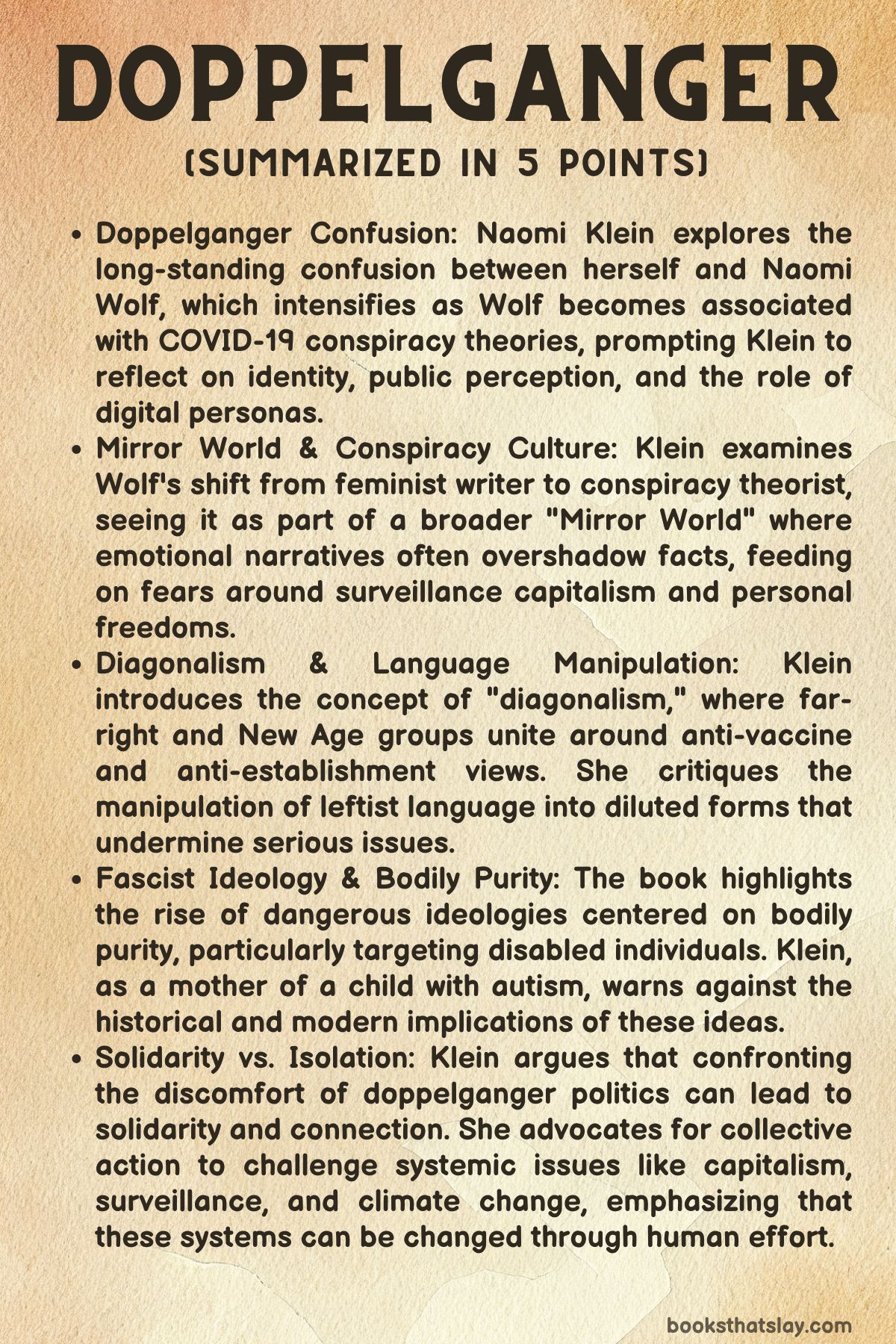Doppelganger: A Trip Into the Mirror World Summary and Analysis
Doppelganger: A Trip Into the Mirror World is a non-fiction book by Naomi Klein, where she delves into the strange phenomenon of being confused with fellow author Naomi Wolf, a situation that escalates as Wolf becomes increasingly associated with conspiracy theories.
Klein uses this confusion as a lens to explore broader societal issues, including surveillance capitalism, political identity, and misinformation. Through the doppelganger metaphor, Klein critiques modern media, political manipulation, and the dangers of blurring truth and fiction, ultimately calling for solidarity and collective action in a world that often distorts reality.
Summary
Naomi Klein’s Doppelganger begins with the personal yet unsettling experience of being mistaken for Naomi Wolf, another well-known writer.
This case of identity confusion takes on new urgency as Wolf veers into promoting conspiracy theories, especially around COVID-19, which leads Klein to reflect on the implications of being linked to someone whose views drastically differ from her own.
Klein delves into this confusion, seeing Wolf as a kind of mirror image—a doppelganger—through which she can examine the state of the world. The doppelganger, she explains, serves as a metaphor for confronting uncomfortable truths about ourselves and society.
Klein first encounters this identity mix-up during the Occupy Wall Street protests in 2011, where both she and Wolf published writing on the movement.
However, their perspectives diverged: Klein approached from a far-left standpoint, while Wolf’s position was more liberal and, eventually, riddled with unverified conspiracy claims.
This confusion reached a peak during the COVID-19 pandemic, with Wolf becoming one of the most vocal figures against vaccines and lockdowns, pushing fringe theories.
Klein, who has spent her life advocating for social justice and anti-capitalist causes, found herself increasingly caught in the shadow of Wolf’s radical claims.
This prompted her to consider the deeper implications of this confusion and how our digital personas complicate our real-world identities.
Wolf’s trajectory into conspiracy theories followed a career downfall after a significant factual error in one of her books was exposed live on air.
Unable to regain her standing in mainstream discourse, she joined forces with figures like Steve Bannon and began promoting anti-vaccine rhetoric, claiming that technologies designed for pandemic control would lead to mass surveillance and global control.
Although her specific claims were inaccurate, Wolf tapped into widespread anxieties about surveillance capitalism and the loss of personal freedoms, making her an appealing figure to those distrustful of governmental authority.
Klein refers to this as the “Mirror World,” where facts are often sacrificed to fuel emotional and conspiratorial thinking.
Klein also observes an unexpected coalition between far-right groups and New Age movements, where skepticism of traditional medicine aligns with anti-vaccine views.
She dubs this phenomenon “diagonalism”—a convergence of unlikely allies who mix leftist and right-wing language. Words like “triggered” or “fake news” are repurposed in this Mirror World to undermine serious issues, a process Klein calls “pipikism,” where significant topics are reduced to absurdity.
She critiques the left for sometimes overcorrecting in response to these distortions, accepting insufficient governmental responses during the pandemic instead of pushing for systemic reform.
Throughout the book, Klein addresses the darker undercurrents of this ideology, especially as it intersects with fascist notions of bodily purity. She recounts the dangerous implications for disabled individuals, noting how eugenicist ideas have long threatened marginalized groups.
Drawing on her own experience as a mother to a child with autism, she calls for a more compassionate and inclusive society.
Ultimately, Klein argues that the forces shaping modern life—from capitalism to climate change—are not as immutable as they seem.
By confronting the discomfort of doppelganger politics and rejecting isolationist tendencies, Klein calls for greater solidarity and collective action to address the pressing issues of our time.

Analysis and Themes
The Doppelganger as a Lens for Social and Political Analysis
In Doppelganger: A Trip Into the Mirror World, Naomi Klein’s central theme revolves around the concept of the doppelganger, not just as a personal anecdote but as a profound framework to examine larger societal and political issues.
Traditionally understood in literature as a figure representing an uncanny double, the doppelganger in Klein’s narrative is a tool that allows her to explore the distortions and reflections within contemporary society. By addressing the confusion between herself and Naomi Wolf, Klein delves into how the digital age amplifies these misidentifications, mirroring deeper social and ideological divides.
The concept of the doppelganger becomes a mirror through which Klein contemplates uncomfortable truths about herself, her politics, and the world at large. Klein’s personal experience with misrecognition becomes a jumping-off point for broader reflections on how political identities and allegiances can be co-opted or distorted, mirroring society’s growing divisions and echo chambers.
The Collapse of Public Intellectual Authority and the Rise of Conspiratorial Narratives
Klein’s examination of Naomi Wolf’s transition from feminist thinker to conspiracy theorist serves as a broader meditation on the fragility of intellectual authority in the modern age.
Wolf’s career implosion, triggered by a factual misunderstanding, symbolizes how quickly public intellectuals can lose credibility, particularly in the internet age, where any error can be amplified and weaponized. This transition is not merely a personal fall from grace but indicative of a larger trend in which intellectual figures, disillusioned with the mainstream, seek validation in fringe movements.
The increasing intermingling of radical conspiracy theories with traditionally liberal or leftist ideologies speaks to the broader erosion of trust in institutions and expertise. Klein’s framing of this shift highlights how public intellectuals can be seduced by more extreme and emotionally resonant narratives when their authority is questioned or undermined.
Diagonalism and the Ideological Cross-Pollination of Extremes
Klein introduces the term “diagonalism” to describe the strange bedfellows that arise when far-right and far-left ideologies intersect, particularly around issues like COVID-19, vaccines, and medical skepticism.
Diagonalism reflects a political and ideological distortion in which seemingly opposed groups share a fundamental distrust of authority and coalesce around conspiratorial thinking. The alliance between New Age wellness communities and far-right conspiracy theorists on issues such as bodily autonomy and medical freedom becomes emblematic of this trend.
Klein’s analysis reveals how diagonalism relies on the co-opting of leftist language and concerns—such as resistance to surveillance or governmental overreach—and reconfigures them into distorted, reactionary frameworks. This suggests a new political landscape where distinctions between right and left become less meaningful than opposition to perceived systemic control.
Surveillance Capitalism and the Commodification of Digital Identity
A significant theme in Klein’s analysis is the omnipresent influence of surveillance capitalism, which she connects to the broader doppelganger metaphor.
Klein argues that the digital age has created “digital doppelgangers,” or online versions of ourselves, which are manipulated and commodified by corporations and governments for profit. This commodification of identity, especially through social media and other digital platforms, reflects a transformation in how individuals are perceived and how they perceive themselves.
The rise of digital identities allows for the kind of misrecognition that Klein experiences with Wolf, but on a larger scale, it contributes to a dehumanizing system where people are reduced to data points. Surveillance capitalism, for Klein, becomes another kind of doppelganger—a shadowy mirror reflecting distorted versions of individual autonomy and freedom, deeply linked to neoliberalism and capitalism.
The Dehumanizing Ideologies of Fascism, Eugenics, and the Purity of the Body
In her exploration of far-right ideology during the COVID-19 pandemic, Klein traces the resurgence of eugenicist ideas, particularly notions of bodily purity and superiority.
Diagonalists, she argues, promote an ideology suggesting the weak or disabled are deserving of death, echoing fascist rhetoric that devalues human life based on arbitrary standards of strength or productivity. Klein ties this resurgence to the history of eugenics and fascism, linking it to her personal experiences as a mother of a child with autism.
The idea that certain bodies are inherently more valuable than others is not new but reflects an ongoing battle against the dehumanization of marginalized groups. Klein deepens the discussion by linking this to historical atrocities like the Holocaust and colonialism, suggesting a continuity of these dangerous ideologies.
Pipikism, Language Distortion, and the Warping of Political Discourse
Another theme Klein develops is the distortion of language in the Mirror World, which she terms “pipikism,” after Philip Roth’s novel Operation Shylock.
Pipikism involves taking serious language and ideas and twisting them into something absurd or meaningless. Concepts like “fake news” or “triggered,” which originally had specific political meanings, are co-opted and diluted by diagonalists and reactionary groups.
Klein argues that this warping of language represents a profound shift in political discourse. Pipikism becomes a tool of doppelganger politics, where serious ideas are reflected back in grotesque or ridiculous forms, making meaningful conversation increasingly difficult.
Colonialism, Global Capitalism, and the Legacy of Historical Atrocities
Klein draws explicit connections between history’s greatest atrocities—colonialism, slavery, the Holocaust—and the modern world’s systemic injustices.
She argues that many of the forces shaping contemporary life, from global capitalism to the nation-state, are built on a foundation of exploitation and violence. These structures, though seemingly permanent, are deeply rooted in systems of power that have dehumanized people for centuries.
Klein suggests that the discomforts of doppelganger politics, where people are reduced to distorted mirrors of their identities, are part of a long legacy of dehumanization. She emphasizes that confronting this history is crucial for real systemic change.
Interconnectedness, Solidarity, and the Possibility of Transformation
Despite grim themes of surveillance, distortion, and dehumanization, Klein ends on a note of potential transformation.
She suggests that the discomfort brought on by doppelganger politics—by seeing oneself reflected in distorted ways—can be a catalyst for greater empathy and understanding. The solution to the political and social divides Klein outlines lies in the possibility of solidarity, particularly solidarity that transcends racial, ethnic, and national boundaries.
Klein advocates for a recognition of interconnectedness, where the suffering of others is acknowledged as part of one’s own existence. This theme of solidarity, for Klein, offers the best hope for a future built on empathy, connection, and collective action, rather than ideological distortion.


